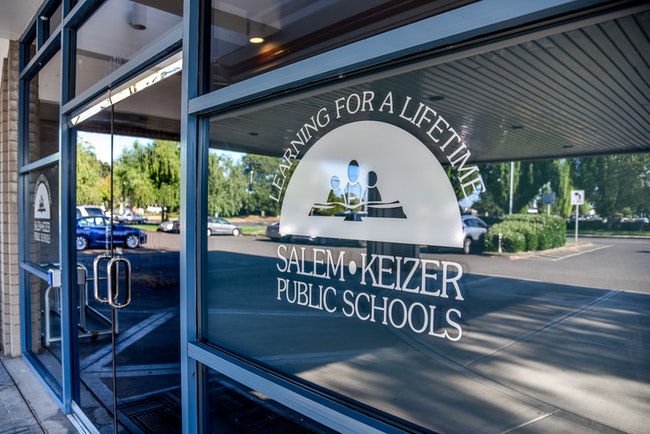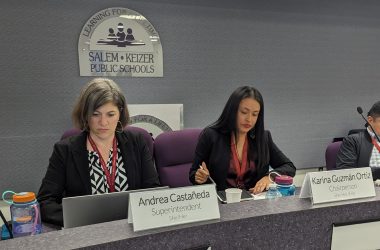
Salem-Keizer administrators plan to revamp the school district’s programs for teaching English to non-native speakers, add more social workers and counselors in schools and improve middle and high school math programs as part of their plan for spending $35 million in new state funding expected in the fall.
The public and school board members got the first look at a general plan for the money at a Tuesday night meeting.
No dollar amounts were included: district administrators will finalize those numbers over the next week and present a more detailed outline at a Feb. 18 school board meeting before hearing public comment.
Still, teachers and educators in attendance said they were surprised by parts of the plan aimed at general curriculum and instructional shifts, many of which weren’t discussed in a community task force that’s been meeting for months to make recommendations to district leaders.
The board first heard from community volunteers Adriana Miranda, executive director of Causa, and Reginald Richardson, vice president of the Salem-Keizer NAACP, who co-led that task force. The group spent months in meetings, interviews and discussions to hear feedback from thousands of parents, students and district staff about how local schools could improve.
In total, the group made nearly two dozen recommendations, with five listed as top priorities. Those included expanded after school activities, hiring more diverse staff, better staff training on disabilities and diverse cultures, and more therapists and mental health professionals in schools.
Dozens of educators packed the board room to listen to the presentation. Many wore the red shirts that became a symbol as thousands of educators marched at the Oregon State Capitol last spring urging legislators to pass a $2 billion education spending bill.
The audience at times snapped or murmured in agreement when Richardson challenged the school board to keep equity at the forefront as they turn the recommendations into a spending plan.
“We have to look at the system within the school, to conform the system to meet the diverse needs of the students, not the other way around. That is really what equity is all about,” Richardson said. “If this is not done, we will miss a once-in-a-generation opportunity.”
Board member Kathy Goss said the group’s suggestions touched on issues often brought to the school board and would help them make needed changes.
“This is just a huge asset to our district in involving those kids that we know need more time and energy,” she said.
Assistant superintendents Kraig Sproles and Linda Myers then presented a rough outline of how money might be spent, in part based on the task force’s recommendations.
But their presentation included more general changes that weren’t part of the task force’s discussion, like adopting a districtwide middle school math curriculum with more coaching for teachers on effective math instruction.
Those additions are aimed at improving specific data points Oregon requires the district to monitor to track the effectiveness of the new funding, Sproles and Myers said.
That came as a surprise to many educators in the room, who expected the spending to be based only on the task force’s work.
“Those are ideas we had not discussed,” said Mindy Merritt, president of the Salem-Keizer Education Association, on the general suggestions.
Merritt was a member of the task force and was among several educators who raised concerns during meetings that the group’s recommendations didn’t do enough to address class size. She said the union will organize educators to come speak at subsequent board meetings.
“Our members left feeling deflated,” she said.
Myers said the district is planning to implement all of the task force’s recommendations in addition to the more general improvements suggested. Administrators will also use the feedback gathered in this year’s budgeting process.
Richardson said he and Miranda discussed the additional items like math curriculum changes with administrators and expected the district would still be able to accomplish the task force’s priorities.
“I don’t disagree with anything they said. The devil is always in the details,” Richardson said.
Reporter Rachel Alexander: [email protected] or 503-575-1241.

Rachel Alexander is Salem Reporter’s managing editor. She joined Salem Reporter when it was founded in 2018 and covers city news, education, nonprofits and a little bit of everything else. She’s been a journalist in Oregon and Washington for a decade. Outside of work, she’s a skater and board member with Salem’s Cherry City Roller Derby and can often be found with her nose buried in a book.









